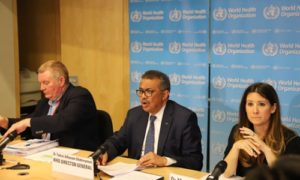
WHO Director-General Tedros Adhanom Ghebreyesus (C) speaks at a daily briefing in Geneva, Switzerland, on March 5, 2020. (Xinhua/Chen Junxia)
By Chen Qingqing and Li Aixin
At this critical time in our history, the G20 leaders are uniting for a virtual leaders’ summit to address the novel coronavirus pneumonia (COVID-19) crisis, which will help coordinate the global response to the disease, according to a statement from the G20.
As the world confronts an unprecedented global health emergency, which is weighing heavily on healthcare systems and the global economy, the upcoming discussions are highly anticipated to address issues including how to prevent the collapse of healthcare systems, a possible economic meltdown and another global financial crisis, which all need bold and decisive actions from the countries involved, according to analysts and officials.
Overwhelmed by the pandemic, some countries are only focusing on their internal problems without providing help to each other, while others will not be able to escape being seriously affected by this crisis without a global coordinating public health mechanism, which is unsustainable, Li Haidong, a professor at the Institute of International Relations of China Foreign Affairs University, told the Global Times on Thursday.
“It’s time to come up with a global governing system for tackling public health emergencies on an international scale,” Li said, noting that the financial resources needed for tackling the pandemic could be allocated and coordinated under the G20 mechanism.
Major multilateral financial institutions also called on G20 leaders to allow the poorest countries to suspend all repayments of official bilateral credit to help them tackle the challenges brought by COVID-19, according to an email sent to the Global Times by the IMF.
David Malpass, president of the World Bank, said this will provide critical support and shorten the time to recovery, as some economists have projected that the pandemic will trigger another financial crisis or recession following the shutting down of businesses and people losing their jobs.
Chinese President Xi Jinping attaches great importance to the global fight against the virus, Luo Zhaohui, vice foreign minister of China, said at a press conference on Thursday.
Xi has communicated with leaders of 22 countries and regions as well as officials from international organizations for 26 times over the phone on the mounting challenge of COVID-19 pandemic over the past two months and will attend a conference of G20 to discuss the pandemic situation, according to Luo.
The international community is anticipating the G20 to promote joint efforts across the world to fight against COVID-19 and stabilize the economy. China is willing to work with G20 member economies to achieve effective results, Luo noted.
China, among the first group of countries to be severely struck by the disease, was also the first one to fully mobilize and coordinate resources on a national scale to fight this battle, providing a set of experiences to the world, including always prioritizing people’s lives, establishing a highly efficient response and command mechanism, mobilizing people from all levels and taking a transparent approach in communicating with the international community, Chinese officials said at Thursday’s press conference.
Compared to the G7, another international intergovernmental economic organization, the G20 is more open and plays an incomparable role in helping to stabilize the world economy and ensure social stability, something that cannot be easily achieved by other multilateral organizations, analysts said.
“More importantly, G20 members embrace the core ideas and propositions of the UN, enabling it to become an effective tool in helping safeguard global economic safety,” Li said.
The World Health Organization chief Tedros Adhanom Ghebreyesus called on G20 countries in a press briefing on Tuesday to stand in solidarity in ensuring protective equipment supplies in the midst of the COVID-19 pandemic.


